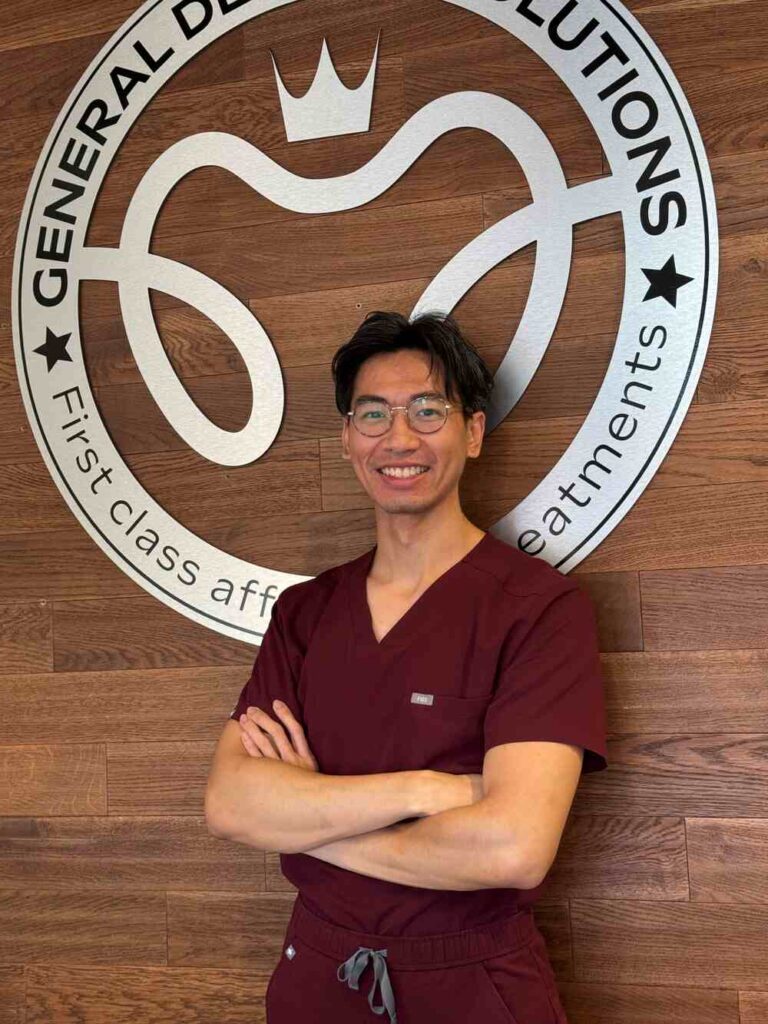How safe is sedation dentistry?
Sedation and general anesthesia are used safely and effectively for thousands of dental procedures every year. Our team will take every precaution necessary to help provide you with a safe and comfortable appointment.
Prior to your appointment, we will review your medical history with you to make sure that you are healthy enough to undergo anesthesia, and that the sedation or anesthetic we use will not interfere with any medication you are currently taking.
In general, dental sedation and anesthesia are safe for most patients. We want to help put your concerns to rest, so if you have any questions about the safety of sedation dentistry, please feel free to get in touch.
Anesthesia Safety Precautions at Our Clinic
In order to keep our patients safe, we strictly adhere to the following in all we do at General Dentist Solutions:
Your Anesthesia is Administered by Health Care Professionals
We have a team of fully qualified dental hygienists and assistants, as well as registered nurses and recovery room staff. We utilize board-certified medical Anesthesiologists for our dental anesthesia procedures.
The clinic facility is fully equipped and set up for sleep dentistry
All the necessary components for safe sedation dentistry are integrated into our dental offices. We have a full recovery bed area, continuously served and monitored by our Registered Nurses.
We have a range of anesthetic equipment, and all the necessary monitors and devices, including full emergency capability. We conform in every way to the stringent certification requirements for sedation and anesthesia of the Royal College of Dental Surgeons.
A large clinical staff
Our clinical staff is very large; far in excess of the numbers required for a typical dental practice. The majority of our team members are dedicated Registered Nurses who are committed full-time to working with our dentists. The best care requires not only the best staff but also ample availability of professional medical staff to provide continuous, top-level attention for our patients.
Ongoing support
We’ve dedicated ourselves to helping those who have recognized that they need our special care and services. We do not judge. We understand that undergoing dental treatment can be stressful, and we want to do everything we can to alleviate that stress for you
Patient information
We know that patients who are well-informed and who know what to expect are those who typically have the most successful experiences with treatment. We encourage you to tell us about your needs and concerns around safety in detail and ask any questions you may have. We’ll listen carefully, and recommend anesthesia and sedation dentistry options based on your unique needs.
What are the common side effects of Sleep Dentistry?
Although side effects are not common, some patients may experience some of the following symptoms after their sedation/anaesthetic:
- nausea and vomiting
- shivering or feeling cold
- bruising around the IV site
- dry mouth or throat
- dizziness
- temporary confusion or memory loss (in the elderly)
Is Sleep Dentistry harmful for my child’s brain?
The effect of anaesthesia on the developing brain is one of the most widely discussed topics in paediatric anaesthesia. There is some controversy surrounding whether anaesthesia can affect the developing brain in children under three years of age, but it is generally accepted that after age three, anaesthesia exposure is very unlikely to affect the brain.
Regarding children under three years of age, there have been three landmark studies conducted in the past five years, and all three suggest that a single, brief exposure to general anaesthesia in children is likely safe. These studies are the Paediatric Anaesthesia Neurodevelopment Assessment (PANDA) study, the Mayo Anaesthesia Safety in Kids (MASK) study, and the General Anaesthesia or Awake-Regional Anaesthesia in Infancy (GAS) study.
The PANDA study compared IQ scores of patients who had general anaesthesia before age three to their siblings who did not have general anaesthesia, and their IQ scores were compared when they were 8-15 years of age. The study found no significant difference in the IQ scores of the patients who had general anaesthesia, to their siblings who did not have general anaesthesia. There was also no significant difference in their cognitive function, such as memory/learning, motor/processing speed, visuospatial function, attention, executive function language, and behaviour.
Full PANDA study article
The MASK study compared three different patient groups: those never exposed to general anaesthesia, those exposed to anaesthesia once before age three, and those exposed to anaesthesia multiple times before age three. They compared general intelligence and neurodevelopment in these three groups. They concluded that exposure to general anaesthesia, either once or multiple times before age three, was not associated with any deficits in general intelligence. However, they stated that multiple exposures to anaesthesia before age three was associated with a modest decrease in fine motor abilities and processing speeds, and the parents of the patients in the multiple exposure group also reported some difficulties with reading and behaviour.
Full MASK study article
The GAS study is the only randomized controlled trial to date (one of the most reliable form of scientific evidence) on the topic of general anaesthesia and the developing brain. This study compared infants (patients under one year of age) who had inguinal hernia repair surgery either under general anaesthesia, or under awake regional anaesthesia (the patients in this group were not under general anaesthesia, they just had “freezing” of their nerves so they could have the surgery without feeling pain.) The study compared the IQ of the patients at age 5, as well as their cognitive scores at age 2. The study concluded that at age 2, there was no difference in the risk of neurodevelopmental outcomes between the patients who had general anaesthesia and those who did not. They also concluded that at age 5, there was no difference in the IQ of the patient group who had general anaesthesia and the patient group who did not.
GAS study article – part 1
GAS study article – part 2
The PANDA, MASK, and GAS studies are three of the best designed studies to examine the topic of general anaesthesia and the developing brain. As the information above outlines, all three studies provide reassuring evidence that a single, brief general anaesthetic in children under the age of three are unlikely to affect their neurodevelopment.
Do you have any questions?
If you fall into one of the above groups, then sleep dentistry may be the answer for you. Call our office for a consultation to discuss your sleep dentistry appointment.

